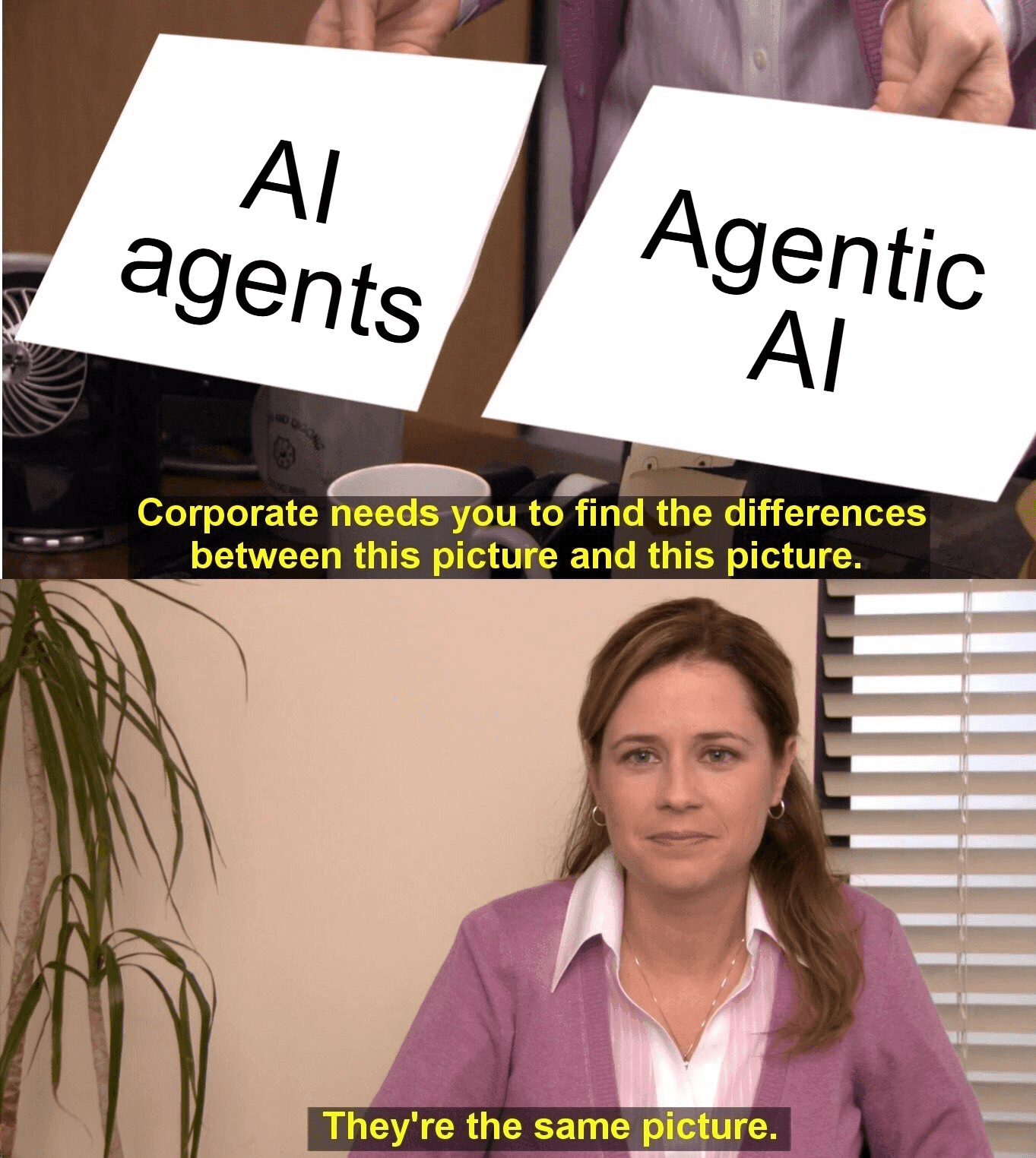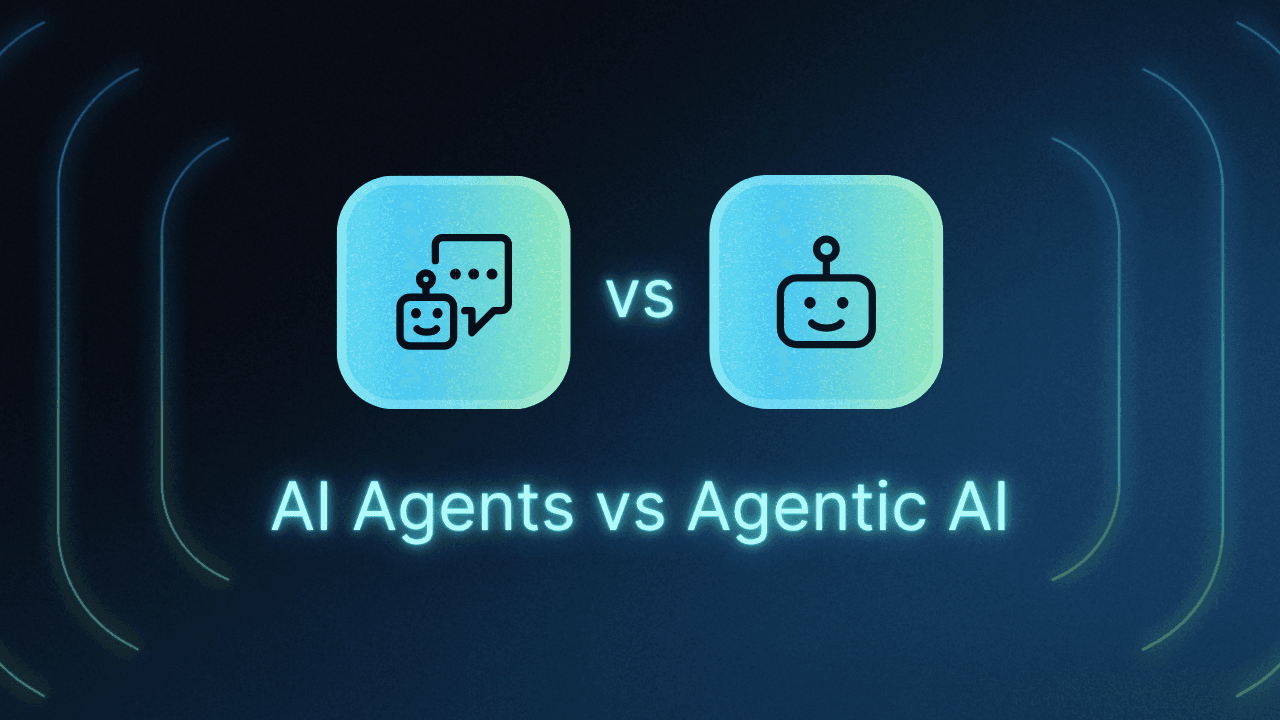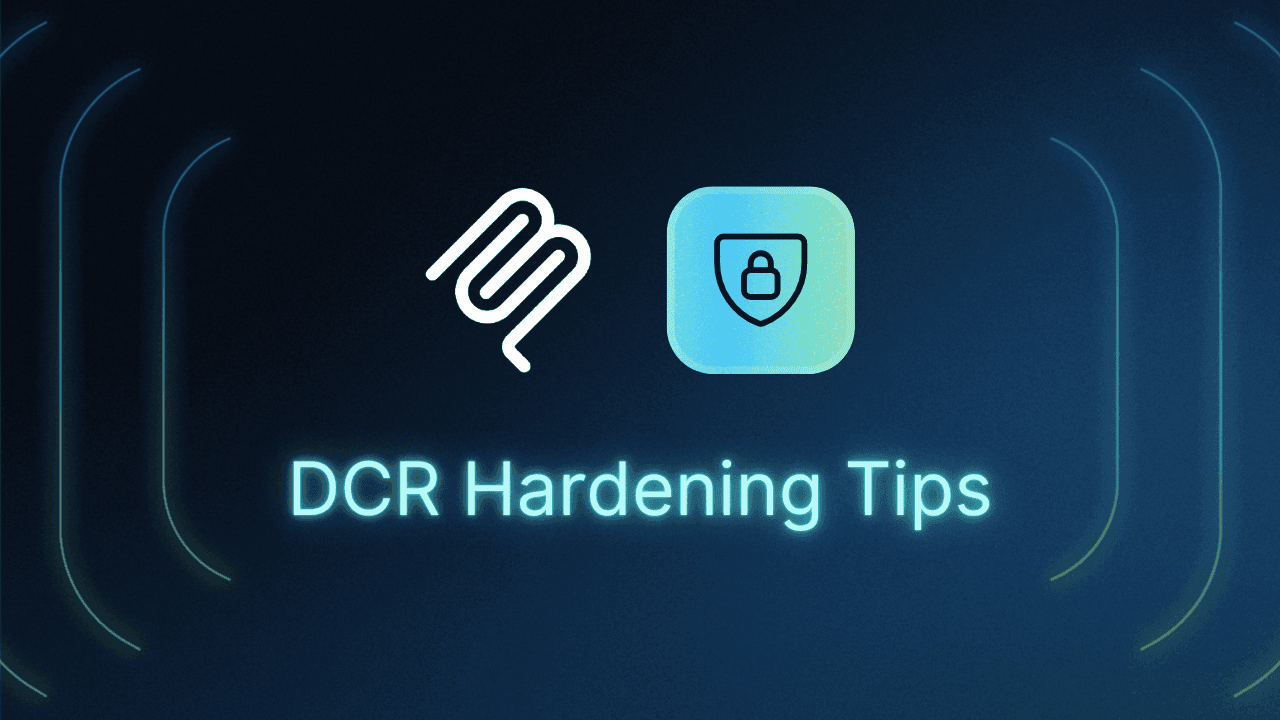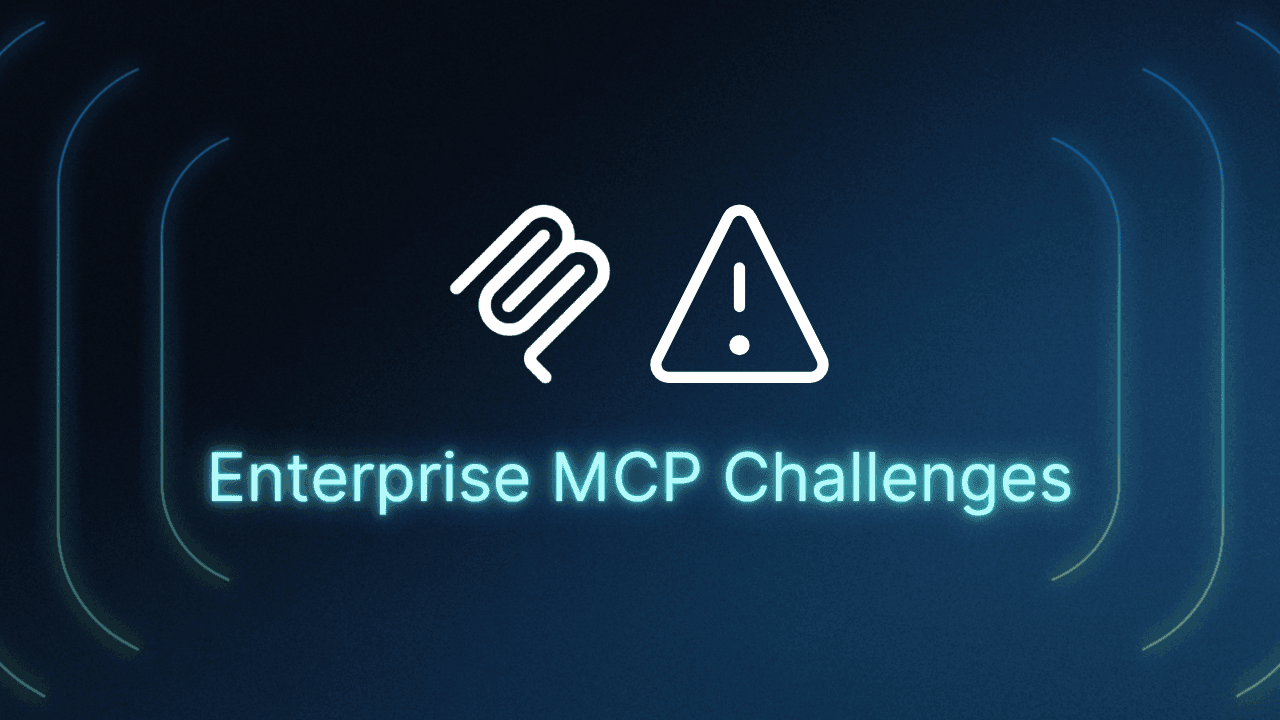Table of Contents
AI agents vs. agentic AI: What’s in a name?
AI conversations move fast, and few terms spark as much head-scratching as “AI agents” and “agentic AI.” At first glance, they sound like rival technologies—but peel back the jargon, and the line between them starts to blur. Are we talking about distinct innovations, or just different ways of labeling the same idea?
In this blog, we’ll cut through the noise, explore how each term is used, and explain why the semantics matter less than the capabilities these systems unlock.
AI agents vs. agentic AI: What’s in a name?
Across the many contexts in which AI tools and systems are being implemented, there is some confusion about two buzzwords: “AI agents” and “agentic AI.” On the surface, these names are quite similar, and the underlying reality is that they do generally refer to the same exact thing.

However, there are some subtle differences in the connotative meaning each word has:
An AI agent is a software entity that performs tasks on behalf of a user, often powered by large language models (LLMs). AI agents are generally individual instances or tools.
Agentic AI is a broader category term that can apply to the functions provided by AI agents. It is often positioned as the broader paradigm of AI behaving with autonomy.
At face value, the difference comes down to category and scope. AI agent is mostly about individual tools or systems, while the agentic AI seemingly refers to the broader approach to AI.
At their core, both of these terms point to the central concept of agency, or AI systems and tools acting on their own, without direct human input. Agency and proactivity are the critical factors, not whether an AI tool is an agent or agentic. Practitioners building and using high-quality AI agent builders don’t usually differentiate between these terms—they’re looking for agency.
Why the terms sound different (but aren’t)
As noted above, there are some differences between “agentic AI” and “AI agent.” While they are ultimately semantic, it’s helpful to dig into what the seemingly surface-level distinctions mean.
On one level, there is the linguistic nuance in the primary root word used in both. “Agent” is a noun and functions as the operative noun in the phrase “AI agent.” “AI” functions as a modifier in this phrase, as it describes an agent that’s powered by artificial intelligence. Conversely, “agentic” is an adjective and functions as a modifier to “AI” in “agentic AI.” In this construction, “AI” is actually the operative noun, as it describes AI tools or systems that are agentic in nature.
However, this surface-level difference belies the underlying link: Both describe AI with agency.
On another level, there’s the historical context in which these terms have been used. “AI agent” is an older term that has been widely used in computer science circles for years. In contrast, “agentic AI” is a newer, trendier term that has exploded in usage in the business community.
As with the linguistic difference, this historical distinction is surface-deep. For most practitioners in the field—developers and adopters—these differences are more semantic than substantive.
Read more: 7 Best AI Agent Builders
Quasi-legitimate distinctions people make
While most experts agree that “agentic AI” and “AI agent” are more similar than different, there are dissenters who draw more concrete distinctions between them—or at least purport to.
The most common differences people claim between AI agents and agentic AI are:
Breadth and specificity – The phrase “agentic AI” is often used to describe the overall approach to AI with agency, while “AI agent” is used to refer to individual applications.
Perceived sophistication – Vendors consider the word “agentic” sophisticated, as its unfamiliarity opens up associations with long-term planning or advanced autonomy.
Hype or attractiveness – Because “agentic” is a relatively unknown term, it can also come across as new and futuristic, making it appealing for media and marketing uses.
In other cases, commentators focus primarily on the different use cases for terminology, even if conceding that the language is surface-deep. A Forbes commentary on AI agents vs agentic AI emphasizes categorical difference, how the former refers to tools and the latter to an approach.
Some of this comes down to more logistical concerns. For instance, the Agent2Agent (A2A) protocol is an easier sell than complicated nomenclature like intra-agentic communication.
Ultimately, AI with agency is taking over, whether it’s called agents or agentic.
Why the debate matters—and doesn’t
While our belief is that this debate is not all that important, it’s worth considering why some stakeholders do put so much emphasis on what AI with agency is called and for what reasons.
For those who place great importance on the debate, the main argument is that the perceived difference between agentic AI and AI agents is valuable. The distinction, to the extent that there is one, can shape funding, adoption, and organizational buy-in. If people are more interested in practical matters, they’ll get more excited about tools they can use than a nebulous paradigm.
For those who feel that this debate doesn’t matter at all, their arguments revolve around the alignment of the terms in technical contexts. The fact that practitioners tend not to distinguish between these terms and semantics doesn’t impact the underlying technology, which is a non-starter.
At Descope, we split the difference between these extremes.
We believe that clarity and precision are important. To the extent that any entity finds value in differentiating a tool or an approach, we respect that. But, for our part, we don’t want to miss the forest for the trees when describing these technologies. AI with agency is too powerful and useful a tool to get lost splitting hairs discussing. It’s best to focus on capabilities and use cases.
Real-world applications of AI agency
The practical value that AI with agency provides defies strict classification under either AI agents or agentic AI. On the one hand, task-focused AI agents streamline resource-intensive areas like customer service, scheduling, and even coding. But they work best when coordinated under a broader agentic program that facilitates communication between individual agent instances.
On the other hand, system-level agentic AI is impressive in its scope. Orchestration platforms, multi-agent research assistants, and workflow automation are all incredibly valuable. But one look under the hood makes it clear that agentic AI is simply multiple AI agents working together.
Ultimately, whether you call it agentic AI or AI agents, these are the applications reshaping work across the globe. And, regardless of how it’s implemented, AI with agency requires security and privacy measures to minimize potential risks.
Read more: Identity Infrastructure for the Agentic Age
Build with agency and protect it
At the end of the day, whether someone says “AI agents” or “agentic AI,” we’re talking about the same capability: AI systems acting with autonomy. The vocabulary may spark debates, but what truly matters is how these systems are built, governed, and secured.
That’s precisely why identity and access management (IAM) becomes a foundational piece of any real deployment of agentic AI or MCP (Model Context Protocol) ecosystems. Without proper IAM, your agentic systems can become security liabilities rather than strategic assets.
Descope is purpose-built to secure AI agents and MCP ecosystems. With OAuth identity provider capabilities, granular authorization, consent management, and auditability, our platform gives you full control over how agents and MCP clients access resources.
Sign up for a Free Forever account with Descope. Or book time with our experts!






